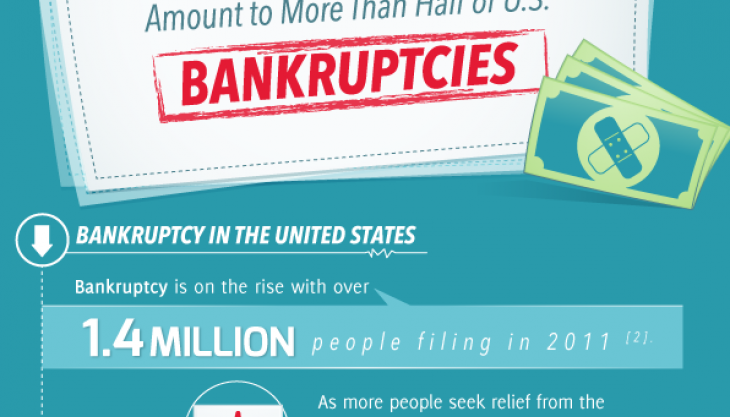The Double Whammy Effect: Medical Bankruptcy on the Rise
Submitted by Rachel R on Thu, 12/27/2012 - 6:24pm

Image source: Visual.ly
More than 1.4 million people filed for bankruptcy in 2011, and many more in 2012 from the economic downturn. More than half of all bankruptcies are rooted in people’s inability to deal with medical bills. With increasing numbers of people living from paycheck to paycheck, it doesn’t take much of medical crisis to put them over the edge. If you’re faced with this situation or are trying to plan your finances to avoid a full-scale medical financial double whammy, these steps can help you stay afloat.
First, know you’re not alone. Medical bankruptcies are on the rise. A Harvard University study published in the American Journal of Medicine revealed that in 2007, fully 62.1% of all bankruptcies filed could be directly traced to medical bills. This is a sharp increase from 2001, in which only 46.2% of bankruptcies could be related to medical bills. The study that focused on data from 2007 found that of the more than 1,000 bankruptcy filers interviewed, 92% held medical debt that was in excess of 10% of their household income.
Image source: Visual.ly
It can happen to anyone, and may be “one more thing” in an already strained financial situation. The other 8% had already either lost their homes or had to mortgage them for medical bills. These are families that are well-educated and solidly middle-class. What’s really interesting, however, is that the majority of medically bankrupt families had health insurance at the time they filed! Less than a quarter of them were without insurance. If you’re already in a strained financial situation and can plan for a medical procedure or a feared illness, start now. Take a look at your finances, understand your insurance, speak with your doctors about advances in technology that may allow you to cut some costs, and investigate any alternatives (such as local programs, payment plans, or employer benefits) that might help you get through a difficult time.
Image source: Visual.ly
Plan for potential income loss. The family member who gets sick or injured ends up losing significant amounts of income. But the double whammy effect is when the spouse also ends up losing significant amounts of income because of the need to care for the other and manage all the other family’s affairs at the same time. This means that the medical bills just start piling up and remain unpaid because of the loss of income. You’ve heard it time and again, but it’s important to build up an emergency fund that equals 6 to 12 months of expenses. This will dramatically alleviate the burden.
Image source: Visual.ly
Know your health insurance alternatives. Right now, if the illness you experience makes you unable to work, your employer-provided health insurance may very well be discontinued. At the national level, at least a quarter of companies immediately cancel health insurance for workers who suffer a disabling illness, and another quarter will do so within a year. In the midst of a medical crisis is also when many people find out that they are under-insured and are responsible for thousands of dollars of out-of-pocket medical expenses. Obamacare is likely to alleviate some of these concerns by providing healthcare to people without employer sponsored plans. But it’s also important to get a full overview of what your insurance covers, and if possible discuss that with your physician’s office before making major medical decisions.
Image source: Visual.ly
Seek qualified help: If you’re already in over your head and are facing major medical bills, it’s important to know when to get an outside opinion. If your medical bills are in excess of $10,000 or you run the numbers and it would take you 30 years to pay them off, talk to a qualified lawyer. Many options may be available to you, including debt restructuring, payment plans, negotiating with creditors, and if absolutely necessary, filing for bankruptcy.
Until the upward spiraling of medical costs and health insurance premiums are definitively dealt with, the number of bankruptcy filings fueled by insurmountable medical debt will continue to rise. If you’re struggling with how to manage your debt payments, talking to an experienced bankruptcy attorney can help you explore all of your options and choose the one that’s right for your situation. The knowledgeable bankruptcy professionals at the Law Offices of John T. Orcutt are here to help guide you on the path to regaining your financial footing.
Dedicated to helping residents of North Carolina find the best solutions to their debt problems. Don’t waste another day worrying about your debt. Call +1-833-627-0115 today to schedule a free initial consultation to discuss your bankruptcy options.
Debts Hurt! Got debt? Need help? Get started below!
Serving All of North Carolina
- Bankruptcy Attorneys Raleigh NC (North)
- Bankruptcy Attorney Fayetteville NC
- Bankruptcy Attorney Durham NC
- Bankruptcy Attorneys Wilson NC
- Bankruptcy Attorneys Greensboro NC
- Bankruptcy Attorneys Southport NC
- Bankruptcy Attorneys Wilmington NC
Bankruptcy Attorneys Raleigh NC (North)
6616 Six Forks Rd #203 Raleigh, NC 27615 North Carolina
Tel: (919) 847-9750

Bankruptcy Attorney Fayetteville NC
2711 Breezewood Ave Fayetteville, NC 28303 North Carolina
Tel: (910) 323-2972

Bankruptcy Attorney Durham NC
1738 Hillandale Rd Suite D Durham, NC 27705 North Carolina
Tel: (919) 286-1695


Bankruptcy Attorneys Greensboro NC
2100 W Cornwallis Dr. STE O Greensboro, NC 27408 North Carolina
Tel: (336) 542-5993

Bankruptcy Attorneys Southport NC
116 N Howe St. Suite A Southport, NC 28461 North Carolina
Tel: (910) 218-8682

Bankruptcy Attorneys Wilmington NC
116 N. Howe Street, Suite A Southport, NC 28461 North Carolina
Tel: (910) 447-2987
